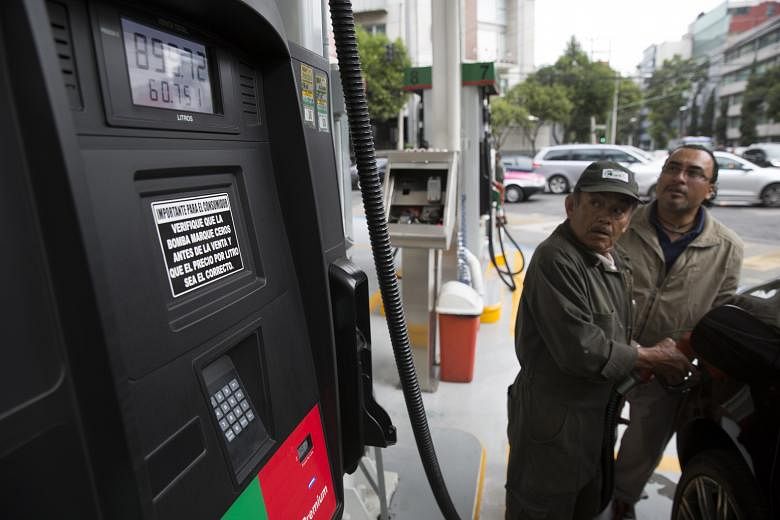Singapore bondholders and lenders, already stung by woes facing Swiber Holdings, are set for mounting pain as a drop in the oil price leaves more companies in the industry starved for cash.
Investment bank UOB Kay Hian warned last week that the sector may suffer a "cascade" of defaults. Bank of Singapore said sustained weakness in crude prices could increase risks. Oil-related firms face S$1.4 billion of Singdollar bonds maturing through 2018, with S$325 million due by the year end, according to Bloomberg-compiled data.
The borrowing that helped build one of Singapore's biggest export industries is showing signs of strain as crude has tumbled about 19 per cent from its high for the year in June. The pain is part of a broader global trend in which smaller, independent oil and gas companies have stumbled. US companies Halcon Resources and Atlas Resource Partners filed for bankruptcy at the end of last month.
"We wouldn't be particularly surprised if there were further defaults coming from the oil and gas industry, particularly if oil stays below US$40 per barrel for a prolonged period of time," said Mr Todd Schubert, head of fixed-income research at Bank of Singapore. "Some bonds are trading at levels that indicate a not-insignificant probability of a restructuring."
Bank of Singapore and UOB Kay Hian were commenting on the industry overall, and not on specific companies.
Oil dropped below US$40 a barrel last week for the first time since April amid renewed concerns over a supply glut, before trading around US$42 yesterday.
The nearest-term bond repayment among oil- and gas-related firms that have outstanding Singdollar bonds is on Perisai Petroleum Teknologi's S$125 million notes that mature in October. The Malaysia- listed offshore drilling and construction firm had RM36 million (S$12 million) of cash and bank balances as of March 31, according to company results.
"Based on their current cash balance, it will be very difficult for them to repay RM546 million of short-term obligations due in October, which includes their S$125 million bond and other loans," said senior analyst Kong Ho Meng at UOB Kay Hian Securities (M) Sdn Bhd.
A Perisai spokesman said the company has been in close discussions with its bankers and financiers to address the bonds, and is confident it will be able to reach an amicable solution for all stakeholders. The firm's S$125 million 6.875 per cent notes due 2016 were quoted at a bid of 75 Singapore cents, according to DBS Bank prices last Friday.
Ezra Holdings, whose services for the oil industry include making wellhead platforms, had US$1.2 billion (S$1.6 billion) of total group borrowings and debt securities as of May 31, according to its financial statements. The group had US$43.6 million in cash and cash equivalents.
Ezra's S$150 million 4.875 per cent bonds due 2018 fell to about 70 Singapore cents on the dollar last Friday, the lowest since at least November 2014, according to Bloomberg-compiled data.
A spokesman for Ezra said the company continues to focus on deleveraging its balance sheet and optimising its debt structure. She also said Ezra is seeking to rationalise non-core assets.
Ezra said in a separate filing last Wednesday that it is in discussions with parties on potential transactions that may include raising funds via new loans, the issue of new securities and the sale of non-core assets.
Swiber stunned the market when it filed to be wound up late last month. The oil services firm subsequently dropped liquidation in favour of a plan to operate under judicial management.
That turnaround only delays the "inevitable cascade" of defaults within the sector, UOB Kay Hian analysts Foo Zhiwei and Andrew Chow said in an Aug 1 report.
"There are a few companies that have similar scenarios as Swiber, meaning high debt levels and weak cash flows," said Mr Joel Ng, an analyst at KGI Securities in Singapore, without specifying any companies. "They still have the option of raising cash through equity markets. If that fails then they may have a problem."
BLOOMBERG

